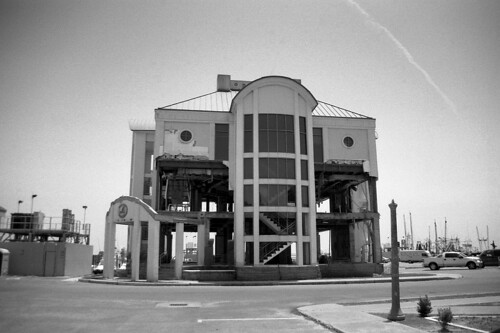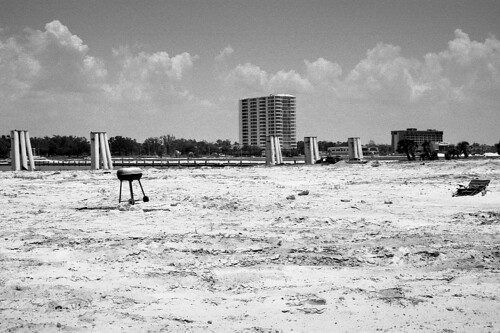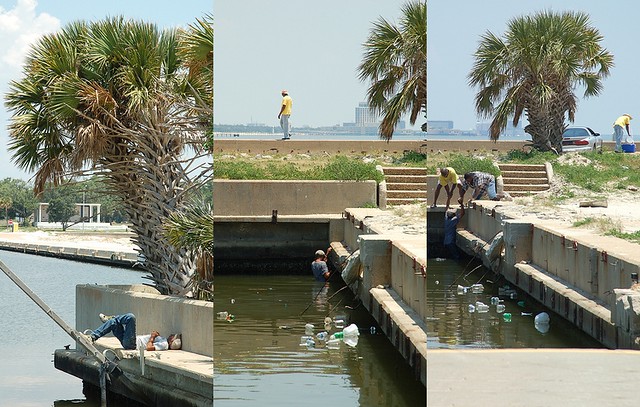In 2009 we drove through what we came to call The Mississippi Vortex: At every stop in The Magnolia State we found a blurring of the lines between fact and fiction, life and death, past and present.
![]() BOSTON STRONG arose from the 2013 Marathon Bombings. NEVER FORGET has been a near-constant exhortation ever since the September 11th attacks. But what slogans have described the reactions to natural disasters? “Rebuild,” “Return,” and “Recovery” were used often after Hurricane Katrina, but none ever became a national catchphrase, shorthand for how those affected most by the storm responded to it. Maybe the 90,000 square miles of damage were just too much, the impact too varied, to capture in two words.
BOSTON STRONG arose from the 2013 Marathon Bombings. NEVER FORGET has been a near-constant exhortation ever since the September 11th attacks. But what slogans have described the reactions to natural disasters? “Rebuild,” “Return,” and “Recovery” were used often after Hurricane Katrina, but none ever became a national catchphrase, shorthand for how those affected most by the storm responded to it. Maybe the 90,000 square miles of damage were just too much, the impact too varied, to capture in two words.
As we drove west along the Gulf Coast in 2009, that destruction wasn’t always apparent. The beaches of Florida’s Panhandle were full of white sand and tourists. Alabama’s Mobile Bay had been a vision of blue water and lush marshes. It wasn’t until we reached Mississippi that the Gulf Coast changed from a picturesque playground into a land scarred by a Category 5 hurricane.
When we first drove through Biloxi it was late at night and we couldn’t see much. Returning the next day along Route 90, we could see the Biloxi area well. Too well. Even for a coastal road like 90 where you would expect broad vistas, there were too few buildings. As we drove on, we realized why: many of them had been damaged or destroyed. To our left were buildings missing signs or even walls, to our right, piles of rubble along the shore. Downtown Biloxi, with its hotels and casinos, stood tall in the distance, but there wasn’t much leading up to it. No signs declared it, but none were necessary: four-years later, this stretch of the Gulf Coast was very much still recovering from Hurricane Katrina.
More than the damaged buildings, what stood out were the piles of rubble along the road known as “Beach Boulevard.” When we found a rubble pile that still bore the yellow lines of parking spaces we pulled over to get a better look at it.
We stepped onto what seemed to have once been a rather large dock, jutting out into the Gulf and surrounded by moorings. Now it was just covered. Some parts by sand, dead fish, and beer cans. Other sections by piles of concrete, wires, tires, and the odd palm tree. We couldn’t tell if the trees had been planted there or left there, but they provided the only shade available on this slab-like island.
There were a couple cars parked at the rubble lot, as well as a few other signs that people came here often, including a Weber grill and lawn chair. Neither was being used at the moment, but the red solo cups by the chair indicated they wouldn’t say that way for long.
Beyond the rubble and the grill were a handful of people fishing off the dock. One, who was wearing a “Confederate Pride” t-shirt and fishing along the edge, told us that we were standing on a former casino-boat dock and parking lot until “the storm picked up the boat and tossed it all the way on top of that building.” He pointed to a twenty-story building at least a mile away.
While we were talking, we heard a splash behind us. At the other end of the dock, a fisherman who had been splitting a 30-rack with his buddies had fallen into the water. We watched as his friends went over, calmly reached down, and pulled him out of the drink.
The simple, quiet reaction of the other fishermen to their fallen friend is what comes to mind when thinking about Biloxi after Katrina. My mind doesn’t go to the quotes of local politicians who compared the initial damage to the effects of a tsunami or to Hiroshima – analogies to foreign devastation work better as sound bytes than mental images. Picturing that casino boat carried by the storm and ramming through roadside buildings on its way to the top of that distant building – that seems too much like a Hollywood special effect. But seeing a lone fisherman falling into the water and his friends helping him – all done without a single yell or shriek – that stuck. That resonated. That showed a small sample of the resilience of the people of Biloxi.
— Dan Meade
Photos: Dan Meade and Rob Bellinger
Date of Visit: June 1, 2009
Published: February 13, 2014
For more on Mississippi after Katrina, see the essays by Todd Bertolaet and others in Southern Spaces’ “Katrina, One Year Later: Three Perspectives” here.




